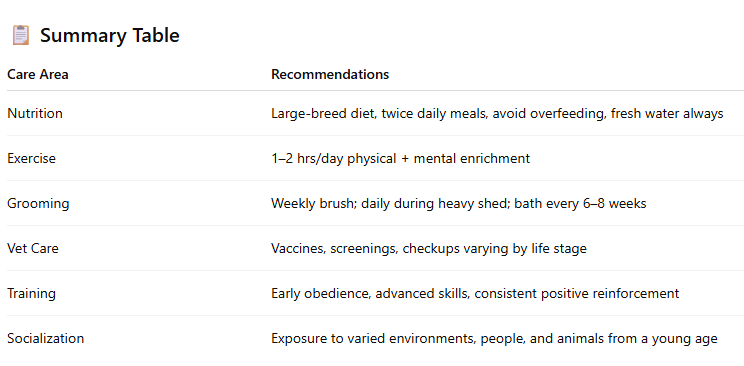How to Care for a German Shepherd: A Complete Guide
HEALTH & WELLNESS
Gabi C.
7/29/20253 min read


German Shepherds are renowned for their intelligence, loyalty, and versatility. Whether as a family companion, service animal, or working dog, this breed thrives on structure, engagement, and strong human bonds. Here's a detailed guide to ensure your German Shepherd leads a healthy, fulfilling life—backed by expert advice and reliable sources.
🥗 Nutrition & Feeding Guidelines
Feeding your German Shepherd a high-quality, age-appropriate dog food is crucial to support their energy levels and physical health. Choose a large-breed formula that lists meat as the first ingredient and includes joint-supporting nutrients like glucosamine and chondroitin (AKC).
Avoid excessive table scraps as these can cause digestive upset — particularly high-fat foods and cooked bones. Treats like small pieces of kibble, dog-safe fruits, or boiled vegetables can be used during training.
💡 Tip: If your dog is eating a complete and balanced commercial food, additional vitamin and mineral supplements are usually unnecessary.
🏃 Exercise & Enrichment
German Shepherds are athletic and energetic—without regular physical and mental activity, they can become bored, anxious, and destructive. Begin with short, daily walks for puppies and gradually increase the intensity as they grow. Adults typically require at least 1–2 hours of exercise per day.
Activities such as agility, herding, tracking, or dock diving provide excellent physical and mental stimulation and can be deeply rewarding for both dog and owner (AKC).
Never let your dog off-leash in unsecured areas—even well-trained German Shepherds can become distracted and bolt.
💇 Grooming & Hygiene
The German Shepherd has a thick double coat that sheds year-round and heavily during seasonal transitions. Brush your dog at least 3–4 times a week, increasing during heavy shedding periods. Bathing should be limited to every 6–8 weeks unless your dog becomes especially dirty or smelly. However, do take care - overbathing can strip natural oils and cause skin irritation.
Don’t forget nail trims every 3–4 weeks, weekly ear checks, and regular teeth brushing. Proper grooming supports coat health and helps you spot issues like fleas, ticks, or skin infections early.
🧠 Training & Socialisation
Start socialisation early by exposing your puppy to various people, sounds, and environments. Enrol in puppy classes and continue with obedience training to reinforce good manners and build a well-adjusted adult dog.
German Shepherds respond best to positive reinforcement training — use treats, praise, and consistency. Their high intelligence and eagerness to work make them ideal candidates for advanced training and even professional roles.
Consistency and reward-based methods yield the best results with this loyal breed.
🩺 Health Considerations
Most German Shepherds are healthy dogs when responsibly bred. Reputable breeders screen for common genetic conditions including:
Hip Dysplasia
Elbow Dysplasia
Degenerative Myelopathy
One life-threatening risk to be aware of is bloat (gastric dilatation-volvulus)—a sudden swelling of the stomach that requires immediate veterinary attention. Learn the symptoms (restlessness, a swollen abdomen, unproductive retching) and consult your vet about preventive measures.
The following health tests are recommended for German Shepherds:
Hip and Elbow Evaluation
Temperament Testing (especially for working or family roles)
Schedule annual checkups for adults and twice-yearly visits for seniors. Keep up with vaccinations, flea/tick preventatives, and dental care.
🏡 Living & Bonding
German Shepherds are not dogs to be left alone in a backyard. They need to live indoors with their family, engaging in daily activities. This breed bonds deeply and thrives in environments where it feels included and mentally stimulated.
📋 Quick Reference Table
✅ Final Thoughts
German Shepherds are extraordinary companions when given the structure, exercise, and attention they crave. With early training, quality nutrition, and responsible grooming and healthcare, your German Shepherd will flourish—physically, mentally, and emotionally.


🌿 Sustainable Pet Care Starts Here
Copyright © 2025 Pet Pomp. All rights reserved.
